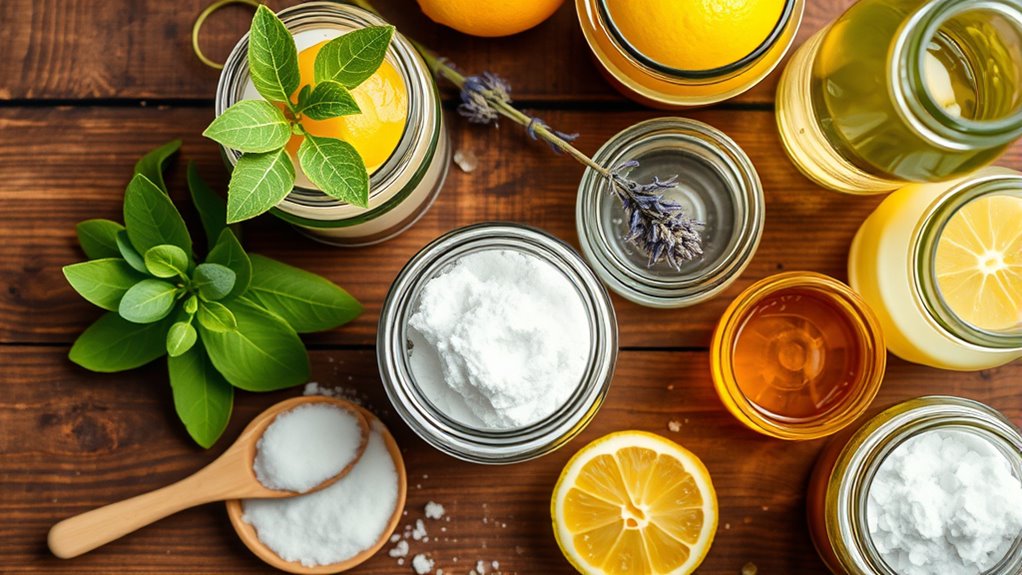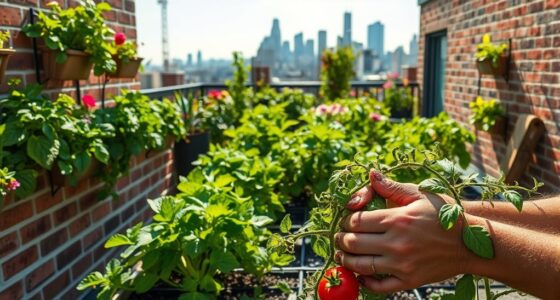DIY eco-friendly cleaning products are a smart choice for a cleaner home and a healthier planet. You can use simple ingredients like baking soda, vinegar, and castile soap to create effective cleaners that save money and reduce waste. These natural solutions are gentler on your skin and avoid toxic chemicals. Plus, with easy recipes for all-purpose cleaners and bathroom solutions, you won’t need to buy commercial products. Explore more ideas to enhance your cleaning routine efficiently.
Key Takeaways
- Homemade eco-friendly cleaners utilize natural ingredients like baking soda, vinegar, and essential oils to minimize environmental impact and reduce packaging waste.
- Simple recipes include mixing equal parts vinegar and water for general cleaning or using baking soda and vinegar for tough stains and unclogging drains.
- Solid dish soap bars eliminate plastic waste from liquid detergents while providing effective cleaning without harmful chemicals.
- Customize DIY solutions with essential oils for pleasant scents and enhanced antibacterial properties, promoting a healthier home environment.
- Always ensure safety by using well-ventilated areas, avoiding toxic chemicals, and securely storing homemade cleaners out of children’s reach.
Understanding Eco-Friendly Cleaning Products
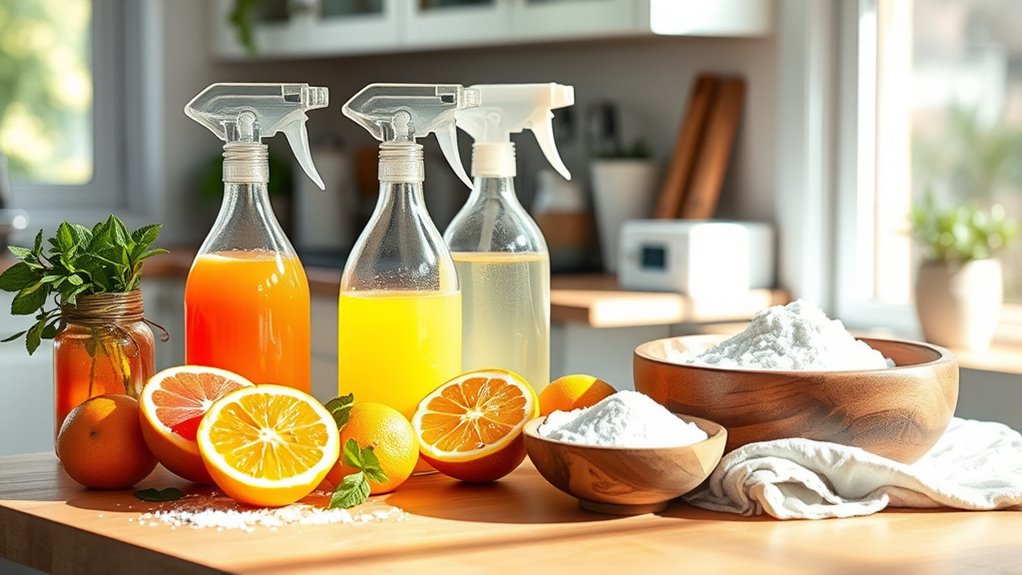
When you think about cleaning your home, choosing eco-friendly products can considerably reduce your environmental impact. These products are designed to minimize harm, using non-toxic ingredients that are safer for you, your pets, and the planet. Additionally, using air purifiers can enhance indoor air quality, making your cleaning efforts even more effective. HEPA filters are a common feature in air purifiers, capturing up to 99.97% of airborne particles, which can further assist in maintaining a clean and healthy indoor environment. Regular maintenance of these purifiers, including filter replacement, ensures they continue to operate efficiently.
Sustainable cleaning involves items with a minimal environmental footprint throughout their lifecycle. Biodegradable products break down naturally, reducing pollution and protecting aquatic life.
Many eco-friendly cleaners utilize renewable resources, like plant-based surfactants and natural enzymes, for effective cleaning without harmful effects. Look for certifications like the EU Ecolabel or Nordic Swan to guarantee the product’s environmental quality.
Benefits of Making Your Own Cleaners
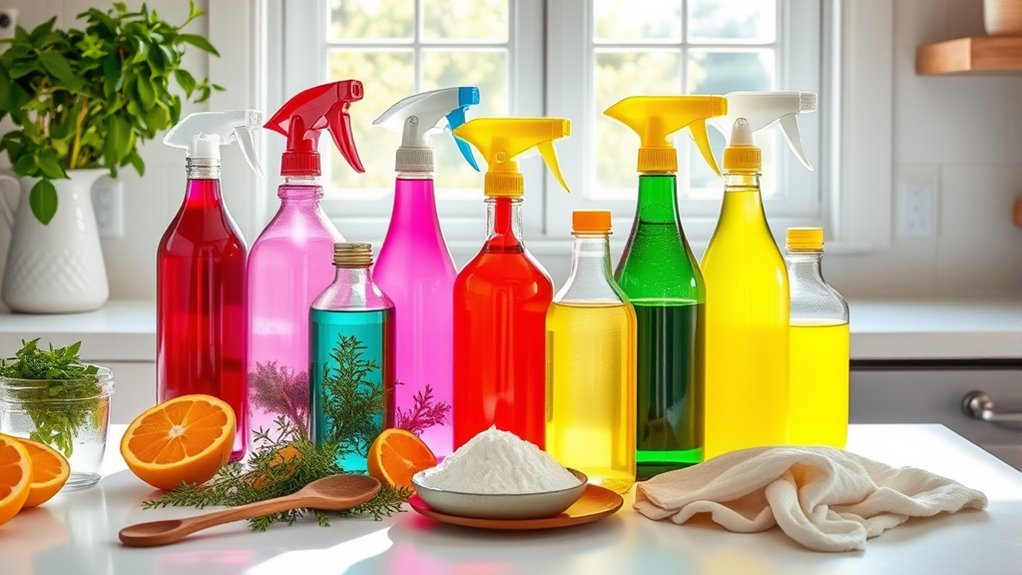
Making your own eco-friendly cleaners not only saves you money but also promotes a healthier living environment. By using readily available household ingredients, you cut down on costs and minimize packaging waste. Natural cleaners tend to keep surfaces cleaner for longer, reducing the frequency of your cleaning routines. They’re gentler on your skin and help avoid respiratory issues caused by harsh chemicals. Additionally, using natural ingredients in your cleaning solutions contributes to a lower risk of accidental poisoning. Moreover, opting for natural alternatives can reduce the presence of toxic chemicals in your home, creating a safer space for your children and pets, lowering the risk of accidental poisoning. Incorporating essential oils in your homemade cleaners can enhance their antibacterial properties and provide a pleasant scent. Furthermore, using vegetarian diets can also support a healthier lifestyle, which complements the benefits of eco-friendly cleaning.
Key Ingredients for Eco-Friendly Cleaners

Creating eco-friendly cleaners involves selecting the right ingredients that harness nature’s power for effective cleaning.
Start with baking soda to deodorize and lift dirt, and add vinegar for disinfecting and stain removal. Castile soap, made from plant oils, serves as a versatile base for various cleaners. Additionally, consider incorporating sustainable cleaning products that are free from harsh chemicals for an even more effective clean. Regular cleaning with these natural ingredients not only keeps your home fresh but also improves fuel efficiency and emissions in products you use. For enhanced antibacterial properties, consider adding tea tree oil to your cleaning solutions. Using high-quality equipment in your cleaning routine can also lead to better results.
Enhance your mixtures with essential oils like tea tree or lavender, which provide antibacterial properties and pleasant scents. For laundry, consider washing soda and borax to boost cleaning power.
Organic coconut and sunflower oils are excellent for soap-making, while plant-based surfactants guarantee biodegradability.
Finally, using sustainable packaging like reusable glass bottles and compostable materials reduces waste and supports your eco-friendly mission.
Embrace these ingredients for a cleaner, greener home!
Simple Recipes for All-Purpose Cleaners
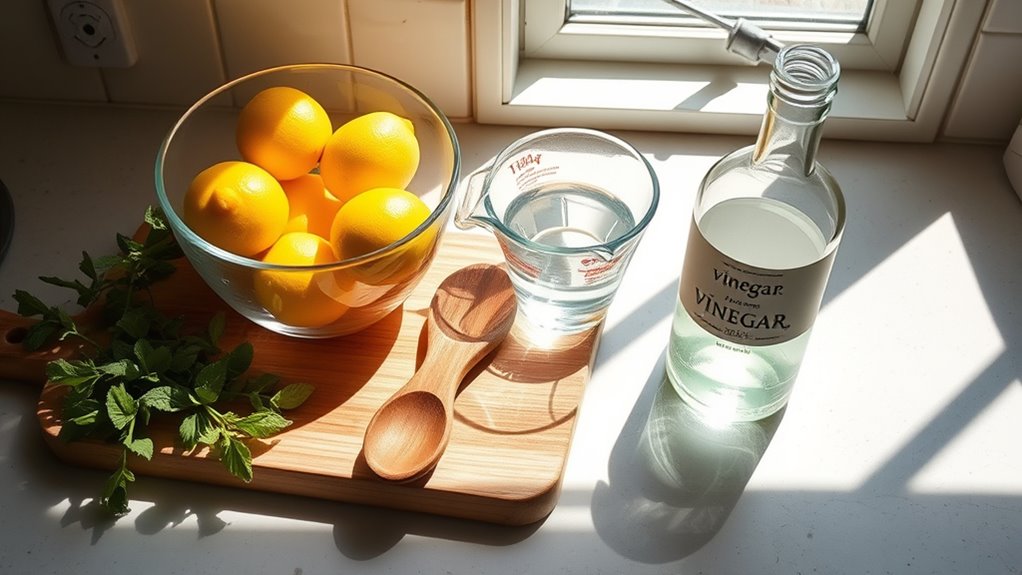
Five simple recipes can transform your cleaning routine with eco-friendly all-purpose cleaners that are effective and safe for your home.
Start with a Castile soap cleaner by mixing water with castile soap for a gentle touch. Castile soap is suitable for various natural cleaning products, making it a versatile choice for your cleaning needs. Additionally, using essential oils in your cleaning solutions can enhance their effectiveness and provide natural antibacterial properties. Implementing multi-functional furniture in your cleaning routine can also help in maximizing space and organization. Creating an organized home can significantly improve your overall well-being and reduce stress.
For general cleaning, combine equal parts water and vinegar.
Try a versatile borax and castile soap recipe with washing soda and essential oils for added freshness.
Create a citrus-infused vinegar using lemon or orange peels for an uplifting scent.
Finally, mix baking soda and vinegar for tougher jobs like drains.
These recipes are easy to prepare, customizable, and cost-effective, allowing you to maintain a clean home without harsh chemicals, ensuring safety for your family and the planet.
Effective Bathroom Cleaning Solutions
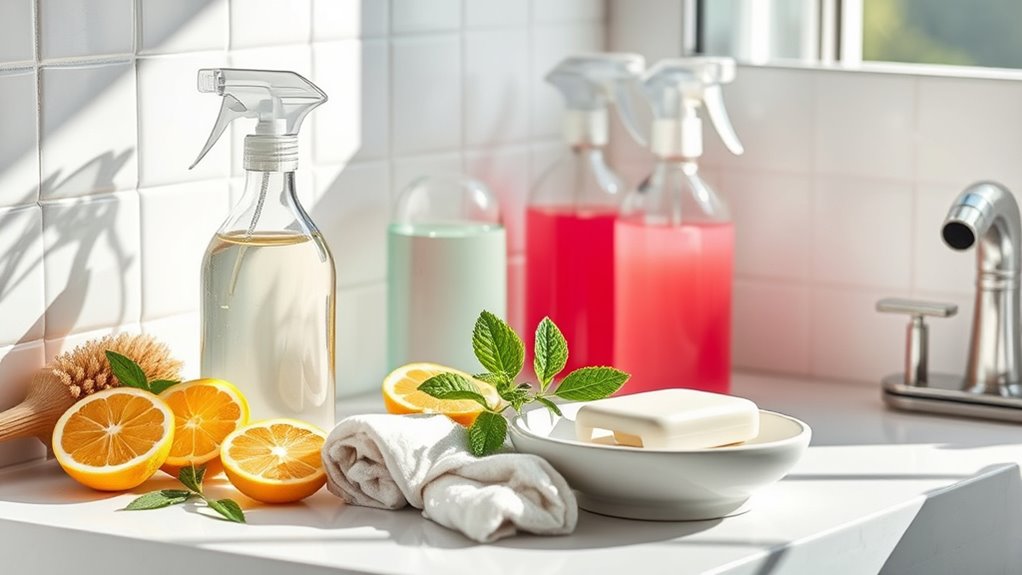
When it comes to keeping your bathroom sparkling clean, eco-friendly solutions can be just as effective as their commercial counterparts. For toilet bowl stains, mix baking soda and vinegar for a fizzy scrub that tackles grime. For tiles and grout, combine baking soda with castile soap in a spray bottle for an all-purpose cleaner. To tackle tough sink and tub stains, lemon juice and salt create a natural abrasive. For clogged drains, pour in a baking soda and vinegar mixture to clear blockages without harsh chemicals. Additionally, using these natural ingredients can contribute to overall wellness, as they avoid harmful chemicals that can affect your health and the environment. Many historic farmhouses also showcase traditional cleaning methods that align with these eco-friendly practices. Incorporating natural ingredients like vinegar can also help reduce household toxins. Finally, use newspapers for streak-free glass cleaning. These simple, natural ingredients not only save money but also create a safer environment for your family and pets, promoting sustainable living practices.
Natural Dishwashing Alternatives
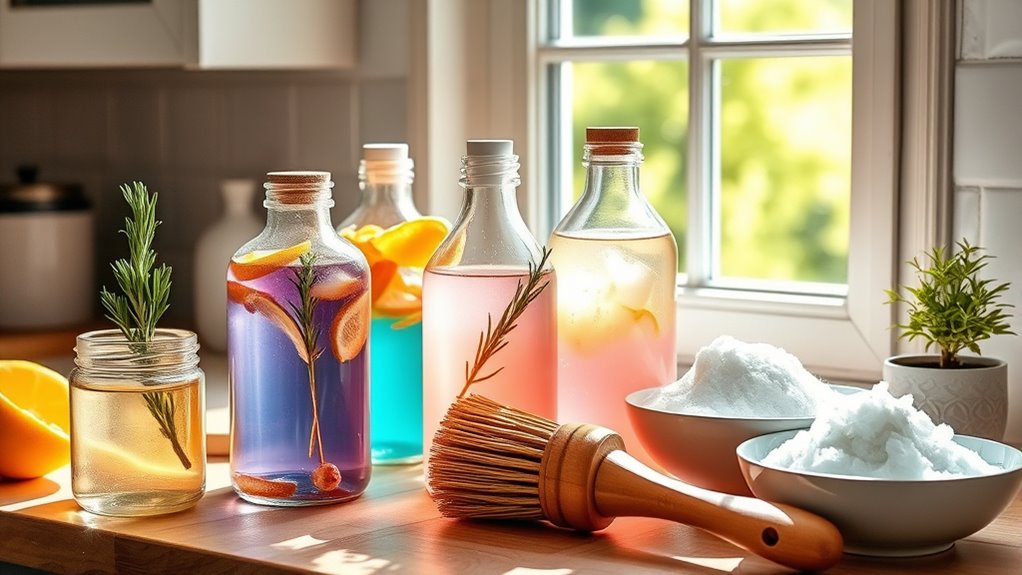
Natural dishwashing alternatives aren’t only effective but also eco-friendly. You can use ingredients like baking soda, vinegar, lemon juice, and castile soap, all readily available in most households. Solid Dish Soap Bars are another great option to consider, as they eliminate plastic bottle waste from liquid detergents while still providing an effective clean. Baking soda acts as a mild abrasive, while vinegar dissolves grime. Butter provides a source of vitamins A, D, E, and K, which can also be beneficial when included in a balanced diet. Lemon juice provides disinfecting properties, and castile soap is gentle on surfaces. Additionally, using chia seeds in your diet can offer health benefits, such as providing essential fatty acids that promote heart health. You can customize your cleaning solution by adding essential oils for scent and antibacterial benefits. Simple DIY recipes, like combining washing soda, baking soda, and citric acid, can save you money and reduce chemical runoff, promoting a healthier environment. For those interested in sustainable practices, using solar panels for camping can also enhance your eco-friendly lifestyle while enjoying the great outdoors.
Eco-Friendly Laundry Detergent Options
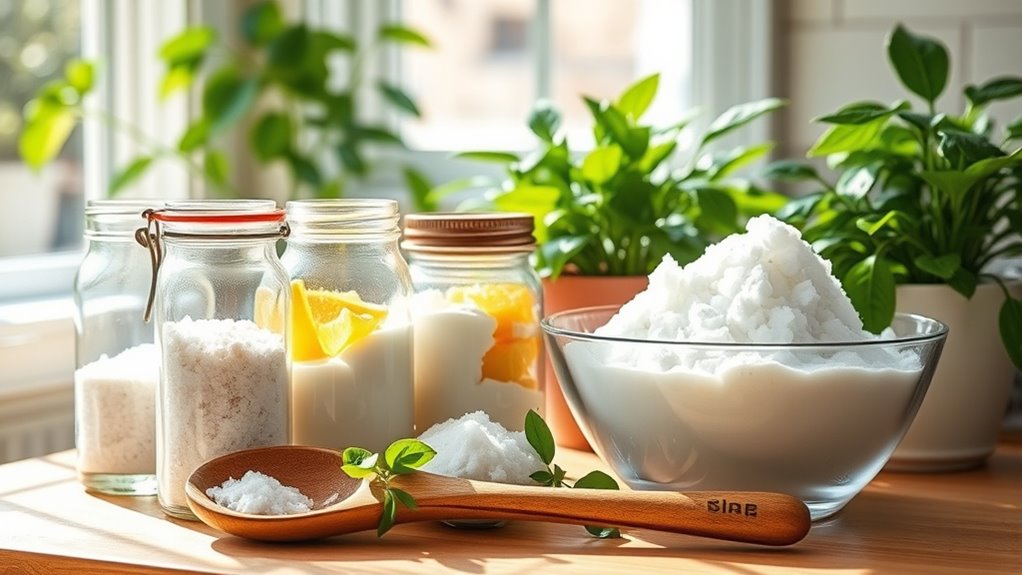
If you’re looking to make your laundry routine more eco-friendly, there are plenty of options available that not only clean effectively but also support a healthier planet.
Consider using plant-based surfactants like Cocamidopropyl Betaine, which are gentle on fabrics and biodegradable. You can enhance your detergent with eco-friendly builders such as sodium citrate to boost cleaning power. Additionally, the use of biodegradable, plant-based ingredients is a key characteristic of eco-friendly formulas that contribute to their environmental benefits. Incorporating raw ingredients can further promote sustainability in your cleaning routine. Heat pumps also utilize advanced filtration systems to improve indoor air quality, which is a crucial aspect of maintaining a healthy home environment.
For a fresh scent, opt for essential oils instead of synthetic fragrances. DIY recipes like a castile soap mixture or a simple powder detergent can reduce toxic exposure and environmental pollution.
Remember to store your detergent in recyclable containers and keep it in a cool, dry place to maintain its effectiveness. Choose products with certifications for added peace of mind!
Safety Tips for Using Homemade Cleaners
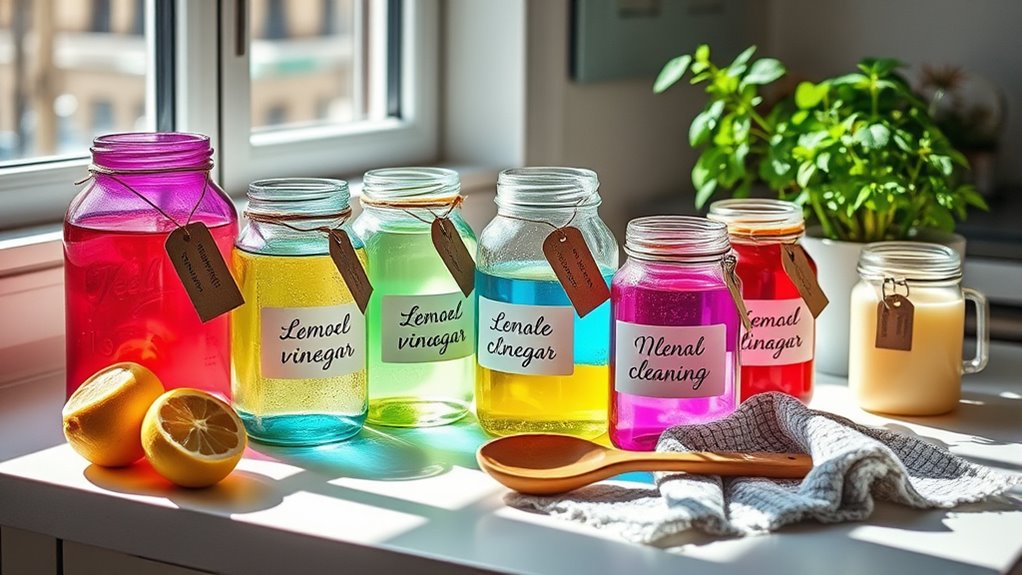
Making your own eco-friendly cleaning products is a great way to reduce chemical exposure, but safety is just as important as the ingredients you choose. Always use natural ingredients like baking soda and white vinegar, and avoid toxic chemicals like bleach. Additionally, using natural ingredients allows for better control over what goes into your cleaning solutions, promoting a healthier home environment.
When preparing your cleaners, work in well-ventilated areas and use clean containers to prevent chemical residues. Wear gloves and goggles to protect yourself from splashes.
Never mix cleaning products that can react dangerously, and test your homemade cleaners on small surfaces first. Store your products securely out of children’s reach, and choose biodegradable ingredients to minimize environmental impact.
Finally, remember to recycle packaging and dispose of any unused products safely. Stay safe while cleaning!
Frequently Asked Questions
How Long Do Homemade Eco-Friendly Cleaners Last?
Homemade cleaners typically last anywhere from 2 to 6 months, depending on their ingredients and storage conditions.
If your recipe includes water, it might only stay effective for 2 to 4 weeks due to bacterial growth. Without water, you could stretch that to 3 to 6 months.
To maximize shelf life, store your cleaners in cool, dark places and consider using distilled water or essential oils for added preservation.
Can I Use Essential Oils Around Pets?
Imagine walking a tightrope, balancing safety and fragrance.
When you ask if you can use essential oils around pets, remember that some oils can be toxic, especially to cats. Oils like tea tree and eucalyptus are more harmful, while lavender is generally safer.
Always keep oils out of reach and consult your vet before use.
With caution, you can create a pleasant environment without risking your furry friends’ health.
Are DIY Cleaners Safe for All Surfaces?
DIY cleaners aren’t universally safe for all surfaces.
While many can work well, you need to be cautious. For instance, vinegar might etch natural stone, and some abrasive ingredients can scratch delicate finishes.
Always test a small area first to verify compatibility.
You’ve got the power to control what goes into your cleaners, but it’s crucial to be mindful of the surfaces you’re cleaning to avoid any damage.
Where Can I Buy Eco-Friendly Cleaning Ingredients?
In this modern age, finding eco-friendly cleaning ingredients is a cinch. You can shop online at retailers like Grove Collaborative and Etsy, or explore options at local health food stores and Whole Foods Market.
For budget-friendly choices, check out Big Green Smile or Regn. Don’t forget home goods stores, which often stock sustainable products.
With so many options, you’ll easily find what you need to keep your home clean and green!
How Can I Store Homemade Cleaning Products?
To store homemade cleaning products effectively, choose clean, airtight containers to prevent contamination.
Glass is a great option since it won’t react with your mixtures. Keep them out of reach of children and pets, and store them in a cool, dry place, away from sunlight.
Remember to label each container clearly for safety and ease of use. Regularly check for spoilage and discard any products that have exceeded their shelf life.
Conclusion
By making your own eco-friendly cleaning products, you’re not just sprucing up your home; you’re also giving Mother Earth a big, green hug. With simple ingredients and easy recipes, you can create powerful cleaners that are safe for your family and the environment. So roll up your sleeves, release your creativity, and watch as your home shines brighter than ever—while knowing you’re doing your part to keep our planet clean and green!
